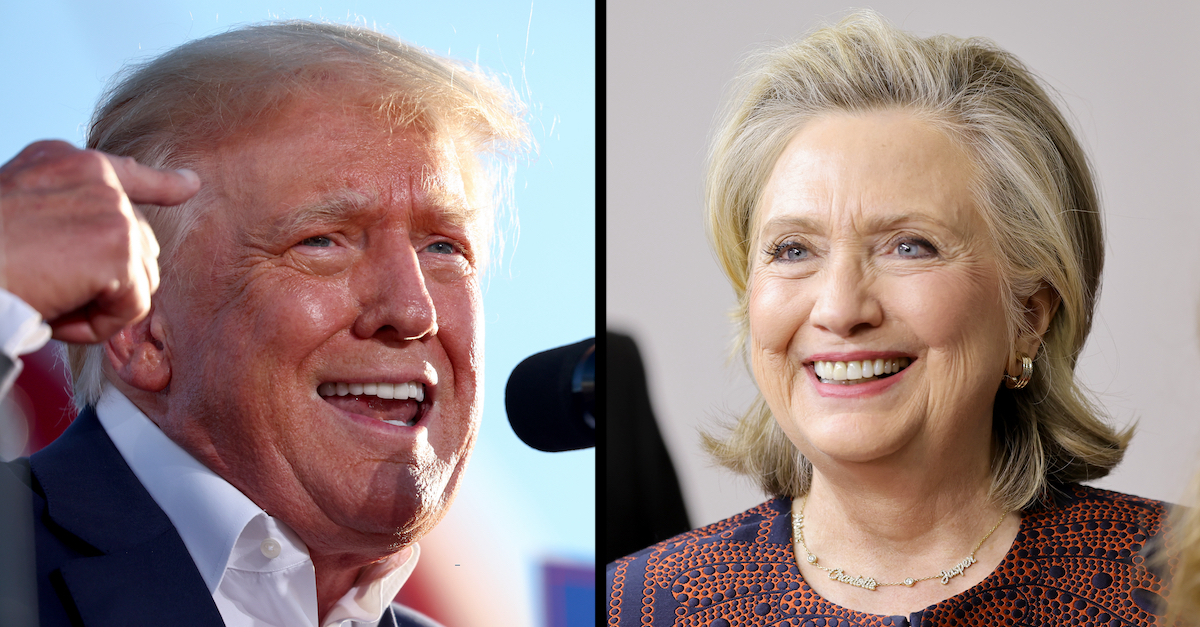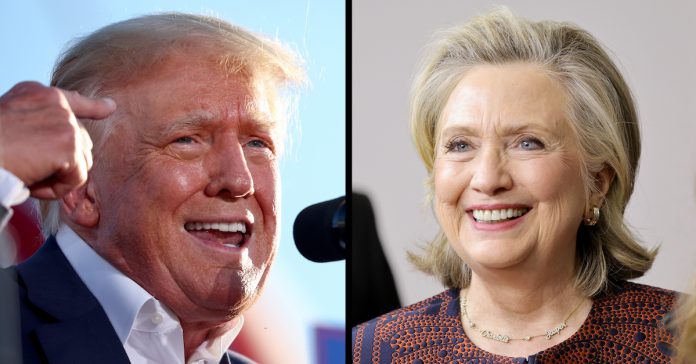
Left: Former U.S. President Donald Trump spoke during a campaign rally at Legacy Sports USA on October 9, 2022 in Mesa, Arizona (Mario Tama/Getty Images). Right: Hillary Clinton attended an event on September 10, 2022 in Toronto, Ontario (Amy Sussman/Getty Images).
A federal appellate court on Wednesday handed President Donald Trump a collection of losses in his yearslong effort to resuscitate a failed lawsuit against Hillary Clinton — and several others — based on claims the 2016 presidential election was rigged against him.
In a 36-page opinion, the U.S. Court of Appeals for the 11th Circuit upheld the dismissal of the lawsuit as to every named defendant and also upheld a nearly $1 million penalty in attorneys fees assessed against the 45th and 47th president and his attorney Alina Habba.
“Many of Trump”s and Habba’s legal arguments were indeed frivolous,” the three-judge panel opined.
The opinion was penned by Chief U.S. Circuit Judge William Pryor, and U.S. Circuit Judges Embry Kidd and Andrew L. Brasher — who were appointed by George W. Bush, Joe Biden, and Trump, respectively.
Love true crime? Sign up for our newsletter, The Law&Crime Docket, to get the latest real-life crime stories delivered right to your inbox.
In March 2022, Trump filed a massive racketeering (RICO) lawsuit against Clinton, the Democratic National Committee, Rep. Debbie Wasserman Schultz, D-Fla., former FBI director James Comey, and other named defendants. The original petition alleged a conspiracy in which the parties worked toward “a nefarious scheme to discredit, delegitimize and defame” the then-first-time candidate Trump.
In September 2022, the litigation was dismissed as a “frivolous” effort lacking “substance and legal support” but rife with “length, hyperbole, and the settling of scores and grievances” by a district court in Florida.
But, in the end, years of appellate life support could not save the case, despite several attempted interventions and one granted extension.
The district court determined Trump had failed to state a claim. The appellate court endorsed that analysis of the case wholeheartedly.
“[T]he district court ruled that Trump brought several frivolous claims, including a ‘malicious prosecution claim without a prosecution,’ and a ‘trade secret claim without a trade secret,'” the opinion reads. “Trump also appended seven counts to his indictment which did not allege any cause of action and which the district court found were ‘the high-water mark of shotgun pleading.'”
A shotgun pleading is a sort of disorganized filing that fails to give the opposing side fair notice of adequate claims or defense. Here, the courts are effectively saying Trump’s lawsuit was a kitchen sink-style attack on his political opponents instead of a genuine lawsuit.
And, notably, the appellate court points out: “Trump leaves all these frivolous claims behind, making a total of 11 of his 16 claims he does not appeal.” As for the five remaining claims actually being appealed, the opinion terms them “untimely and otherwise meritless.”
The president’s loss was, perhaps, presaged by the attitude expressed by the appeals court during a hearing in the case just last week.
During arguments, Pryor mockingly told Trump appellate lawyer Richard Klugh: “I can read this complaint, it’s a shotgun pleading. There’s no question about that, is there?”
While the initial dismissal was already on appeal, Trump and his attorneys “moved the district court to reconsider each order in the light of a report by Special Counsel John Durham,” which the lower court declined to do — and which was subsequently appealed as well.
The appeals court flatly rejected the idea of giving legal relevance to the report, saying Durham’s work “does not change our conclusions.”
“They tell us that the report establishes ‘that a federal investigation of the relevant conduct was ongoing during’ Trump’s first presidential term,” the opinion continues. “But the existence of an investigation was already evident at the time of—and expressly mentioned in—the amended complaint. Trump and his attorneys offer us no reason to reverse the district court.”
As for the sanctions, the appeals court echoes itself and its repeated invocation of the district judge’s findings, finding no error there.
“Trump’s attorneys filed the amended complaint in bad faith,” the opinion goes on. “Trump’s attorneys give us no reason to conclude the district court clearly erred in that finding.”
The opinion explains the upshot of the sanctions, at length:
[D]efendants jointly moved for sanctions against Trump and his counsel. The district court granted their motion. This time it issued sanctions based on its inherent authority. It described the shotgun pleadings, knowingly false factual allegations, and frivolous legal theories as evidence of bad faith. It also mentioned other “[f]rivolous lawsuits” Trump had filed to establish he had a “pattern of misusing the courts.” It calculated the fees and costs requested by defendants as slightly more than $1 million. It ruled that the amounts requested were largely reasonable, in part because the requests were “substantially discounted” from the total charged. It then considered Trump’s line-by-line objections to the hours billed and reduced certain attorneys’ hours to account for vague or block billing. It assessed a total of $937,989.39 in fees and costs. It found Trump and Habba, along with Habba’s law firm, jointly and severally liable for that amount.
“Trump and his attorneys committed sanctionable conduct,” the opinion summarizes.
The opinion, however, contains one silver lining for Trump.
While the appeals court affirmed the dismissal as to every defendant, one defendant was ultimately not nearly as lucky as the rest.
The district court dismissed the case with prejudice for every defendant; the lawsuit cannot be refiled against them. But the lower court lacked jurisdiction over one such defendant, so the dismissal with prejudice is not allowed to stand, the appeals court ruled.
The appeals court affirmed the dismissal of the case against Orbis Business Intelligence, the private intelligence company owned by former British spy Christopher Steele, just without prejudice.
Matt Naham contributed to this report.

